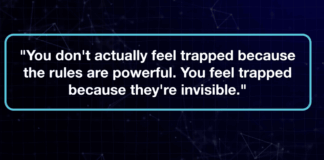
Authored by Stillness In The Storm
Finding a suitable (and respectful) way to correct a person who maintains a wrong idea is something everyone should learn to do. After all, fake news abounds, meaning it’s very easy to take them as facts. What’s truly complex and what you should fight against is that disease that afflicts so many people in the world: the need to be right.
Assuming that everyone makes mistakes is essential. This is an exercise in humility because it’s true. But if it’s hard for you to assume that making mistakes is human, then you’ll have a harder time convincing others of their misconceptions. Thus, how can you do it without it leading to an argument? Is there a strategy to make a person aware that a certain idea is wrong without it leading to tension and negative emotions that often escalate?
You could say that it’s a matter of tact but, in fact, it goes way beyond being knowledgeable and capable of correction. You must do so intelligently, however. This is because you must be prepared to recognize that it’s quite possible that you’re the one who’s wrong.
After all, it’s about knowing how to pave the ground for dialogue in which respectful and assertive communication can flourish. One in which ideas can flow and arguments maintain an adequate tone.
Strategies to correct a person who maintains a wrong idea
Everybody wants to be right. Defending one’s own truth is a virus that afflicts the entire world population. Most people cling to their ideas like sails to their mast and like fire to a match. You can assume that, for many, mistakes show weakness. Thus, few people feel comfortable failing or hearing they’re wrong.
Thus, have you ever felt like you had to correct a person who maintained a “wrong” idea? It’s common, for example, for it to happen with people who you’re very close to. For instance, it happens when, even after going through the same experiences, most remember it in a certain way, but there’s always someone with “false memories”.
Here’s an example in the context of a workplace. Have you ever had to get a colleague to realize that what they said or did wasn’t true or correct?
Everyone has been through one of these situations. And, admit it, you’d love to be able to handle them with greater success. Thus, continue reading to find out some ways to do so.
When it comes to correcting a person who maintains a wrong idea, you shouldn’t start with expressions such as “What you’re saying isn’t true”, “That isn’t entirely true”, or “Look, you’re doing it wrong”. Such phrases will only put the person in front of you on the defensive as soon as you begin to talk.
It’s a much better idea to use convincing skills and argue things more intimately, approaching them as positively as you can. For example, “Yes, it’s true we went to this town, and it’s also true we stayed in a fairly old hostel. You’re right about that. However, your brother wasn’t on that trip because he was still working in…”
“It’s especially hard to admit that you made a mistake to your parents, because, of course, you know so much more than they do.”
-Sean Covey-
To correct a person who maintains a wrong idea, mind your tone of voice
When you correct someone and point out their mistakes or wrong approaches, it’s fairly easy to use, almost instinctively, an authoritarian, ironic, or confrontational tone of voice. You must avoid doing this as much as you can.
Your tone of your voice is as important as your arguments. You must be tactful, empathetic, and calm while you try to communicate.
Back up your arguments with data
When it comes to correcting a person who maintains a wrong idea, you mustn’t start by saying that you’re the one who’s right. This is because truth without back up doesn’t mean anything as there isn’t enough data to support it. It’s just smoke and can easily go out through a window.
Thus, to show, without impositions, that you’re right, you must do so with solid arguments. And to do so, you must communicate assertively and give detailed, objective information.
In addition, it’s essential for you to listen empathetically so you can respond appropriately.
Assume you won’t always be able to convince the other person
Yes, you won’t always be able to convince another person that they’re wrong about something. Thus, when it comes to correcting a person who maintains the wrong idea, assume that some people aren’t interested in seeing things from your point of view. This occurs, for example, with cases as complex as someone defending creationism or certain cults or those who are against the use of medication.
There are facts some people just can’t understand. And they occur every day because you must deal with set values and religions. As you can see, fanaticism and ideological misunderstandings are rather difficult to debate. Pointing out the mistakes of those who protect themselves with myths is as complex as it is exasperating.
Acceptance is the only thing you can offer in the light of these situations and other simpler ones, such as those related to false memories. And on those in which your interlocutor insists on defending their position. Remember that you live in a world in which every person defends their point of view.
Source: Sharing Truth With Dignity
Disclaimer: We at Prepare for Change (PFC) bring you information that is not offered by the mainstream news, and therefore may seem controversial. The opinions, views, statements, and/or information we present are not necessarily promoted, endorsed, espoused, or agreed to by Prepare for Change, its leadership Council, members, those who work with PFC, or those who read its content. However, they are hopefully provocative. Please use discernment! Use logical thinking, your own intuition and your own connection with Source, Spirit and Natural Laws to help you determine what is true and what is not. By sharing information and seeding dialogue, it is our goal to raise consciousness and awareness of higher truths to free us from enslavement of the matrix in this material realm.
 EN
EN FR
FR



























I hope it’s becoming visible alright:
https://st6.ning.com/topology/rest/1.0/file/get/4979362093?profile=original
Here’s an excellent example of what one can perceive to be the “energetic playground” on planet Earth and what it can offer.
“The Poker Game
50.7 Questioner: Thank you. Can you expand on the concept which is this: that it is necessary for an entity to, during incarnation in the physical as we call it, become polarized or interact properly with other entities and why this isn’t possible in between incarnations when he is aware of what he wants to do, but why must he come into an incarnation and lose memory, conscious memory of what he wants to do and then act in a way that he hopes to act? Could you expand on that, please?
Ra: I am Ra. Let us give an example of the man who sees all the poker hands. He then knows the game. It is but a child’s play to gamble, for it is no risk. The other hands are known. The possibilities are known and the hand will be played correctly but with no interest.
In time/space and in the true-color green density, the hands of all are open to the eye. The thoughts, the feelings, the troubles, all these may be seen. There is no deception and no desire for deception. Thus much may be accomplished in harmony but the mind/body/spirit gains little polarity from this interaction.
Let us re-examine this metaphor and multiply it into the longest poker game you can imagine, a lifetime. The cards are love, dislike, limitation, unhappiness, pleasure, etc. They are dealt with and re-dealt and re-dealt with continuously. You may, during this incarnation begin — and we stress begin — to know your own cards. You may begin to find the love within you. You may begin to balance your pleasure, your limitations, etc. However, your only indication of other-selves’ cards is to look into the eyes.
You cannot remember your hand, their hands, perhaps even the rules of this game. This game can only be won by those who lose their cards in the melting influence of love; can only be won by those who lay their pleasures, their limitations, their all upon the table face up and say inwardly: “All, all of you players, each other-self, whatever your hand, I love you.” This is the game: to know, to accept, to forgive, to balance, and to open the self in love. This cannot be done without forgetting, for it would carry no weight in the life of the mind/body/spirit beingness totality”.
Source: http://www.lawofone.info/
Hello M. Harrison. I believe, once you know for yourself while trying to discern which data was created by the good guys versus the bad guys, that reading and understanding lead to knowing, eventually, you’ll experience that doing your own research, choosing your own path for investigation and figuring out things, will dissolve the issue of data and the accuracy of their sources, in a friendly manner.
In the East, knowledge is obtained through observation and critical logic to find truth. There are four sources of valid knowledge; 1) Perception achieved through the 5 senses, 2) Inference – cognition based on previous knowledge or experience, 3) Comparison and 4) Testimony.
But in the West, we say ‘back it up with data, research’.
Well, if the devil did the research what good is the data?
In your arguments, how will you discern which data was created by the good guys versus the bad guys?
Reading and understanding something is much different than KNOWING something.
‘Well, if the devil did the research what good is the data?’
Amen, brother. that is 100% what my disposition is too.
“O you who believe! If a Faasiq (evil person) comes to you with any news, verify it, lest you should harm people in ignorance, and afterwards you become regretful for what you have done” [al-Hujuraat 49:6]
O ye who believe! If a wicked person comes to you with any news, ascertain the truth, lest ye harm people unwittingly, and afterwards become full of repentance for what ye have done.
Allah’s Messenger Prophet Muhammad (Sal Allaahu Alaiyhi wa Sallam) said:
“Deliberation is from Allaah and haste is from the Shaytaan.” (al-Silsilah al-Saheehah)